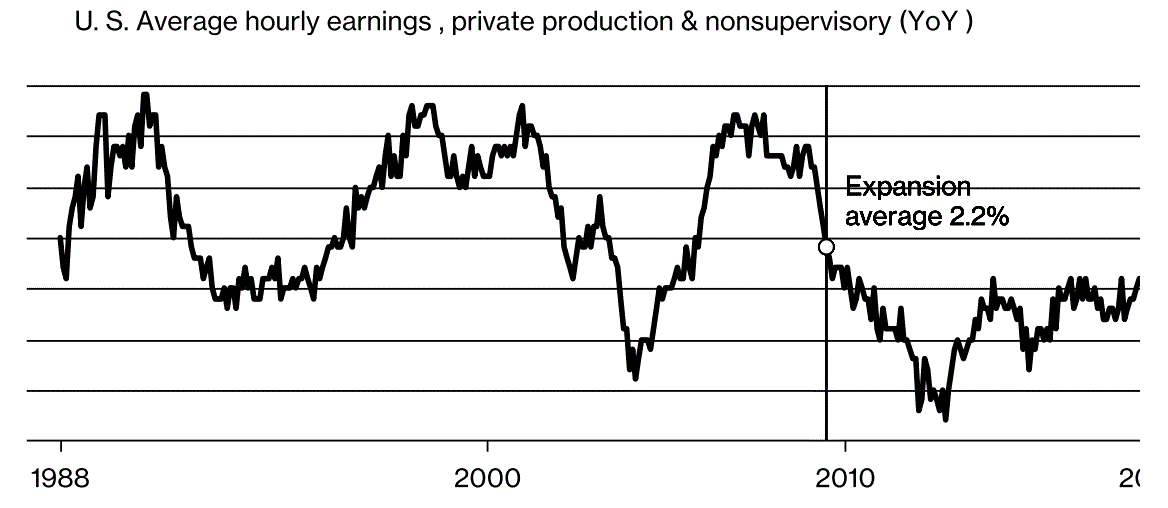Weak Wages
Worker pay growth is lagging gains in recent U.S. economic expansions

Source: Bureau of Labor Statistics
With wage growth still weak, new tech like Instant Financial is helping companies boost retention with hourly workers.
By Sho Chandra
July 24, 2018, 5:00 AM EDT - Bloomberg
For Shaahir Liles, itfs like having payday every day. An assistant manager at a Wendyfs in Towne Lake, Ga., Liles says hefs less stressed out since his employer started offering workers a new perk—a financial app he can tap as often as he wants to get money. gI signed up, and Ifve loved it ever since,h he says of Instant Financial, a mobile-based service that allows him access, free of charge, to half of his prior dayfs earnings to cover expenses between paydays, or even to get extra dollars for a night out. gIt gives you the freedom to cash that money out, just in case.h
Employers looking to attract and retain hourly workers have to get creative as the labor market tightens. One way to reduce churn is to reduce the wait between paychecks. The benefit was being rolled out at the Hoover Foods Inc.-run franchise when Liles began working there in February. By June, 24 of 30 employees at that location were using it, he says.
A conundrum of the current expansion is that, while unemployment is almost the lowest itfs been since 1969, many Americans face income and job instability or are routinely cash-strapped. The monthly job numbers gpresent a much more positive picture than a closer inspection of the labor market would suggest,h says Jonathan Morduch, professor of public policy and economics at New York University and co-author of The Financial Diaries: How American Families Cope in a World of Uncertainty, published last year. gThe big story is, a lot of workers are facing liquidity problems because wages havenft been risingh fast enough, he says.
Weak Wages
Worker pay growth is lagging gains in recent U.S. economic expansions
Source: Bureau of Labor Statistics
Two in five American adults lack enough savings to cover a $400 emergency expense, and 1 in 4 donft think theyfre gat least doing OKh financially, according to the results of a late 2017 Federal Reserve survey, released in May. More than 1 in 5 respondents said they were unable to pay the current monthfs bills in full, and more than 1 in 4 skipped necessary medical care last year because they couldnft afford it.
Wage earners, especially in retail and service industries, continue to struggle with uncertain or fluctuating schedules, variable earnings and overtime, and dependence on tips and commissions. Employers are increasingly focusing on nonwage benefits rather than salary hikes, while workersf bargaining power has softened amid waning labor union membership. The increasing dominance of large companies in certain economic sectors is another factor holding down pay. Morduchfs own research also showed the average household experiences volatility in income and spending almost half the year. This instability gis creating a lot of economic insecurity and anxiety,h he says.
Credit card companies or payday lenders have, of course, targeted customers facing a cash crunch. But unlike those businesses, the instant-pay financial apps gaining popularity involve no interest charges or penalty for withdrawing earnings early. On New York-based DailyPay, which launched its service in August 2015 and claims 500,000 users, workers pay a fee of $1.25 to $2.99 per use, depending on whether they want their funds to clear the next day or immediately.
Atlanta-based Instant Financial says itfs accumulated more than 250,000 users since its U.S. debut in early 2017. The company doesnft disclose the monthly fees it charges corporate clients that sign up to offer the service to their workers (they include franchisees of McDonaldfs Corp. and Outback Steakhouse). Workers have a three- to four-hour window daily to transfer, for free, as much as 50 percent of their previous shiftfs wages onto a debit card.
Tonya Childs, a worker at a call center in Lewiston, Maine, operated by Argo Contact Centers, has come to rely on the Instant Financial app. gIt helps to hold you over until you get the next paycheck,h she says—otherwise, gthose 14 days can really drag.h
Employee turnover has diminished since Hoover Foods introduced the Instant Financial app at the Wendyfs franchise where Liles works. Most of the crew is still around from the time he joined, and theyfve added two workers instead of gswapping people every other month,h he says. gIt can change the way people hire.h
But there can be unintended consequences for users of such apps. Getting hooked on the almost constant money flow could prompt some people to overspend in the current pay cycle and end up with less money for savings or for bigger end-of-the month expenses.
Another downside is that some workers may settle for lower-paying work just because it comes with faster access to their pay and forgo a slightly better-paid position. The Fed survey showed that, when faced with a hypothetical choice, workers mostly preferred month-to-month income stability over higher compensation. More than 50 percent chose the stable-income job despite giving up a little or somewhat more money. Even when the variable-income job paid a lot more, only 3 of 5 respondents picked it.
Kayla Oliver, 22, says she enjoys the freedom of being able to text DailyPay an emoji—each one is worth $20—every time she needs a cash infusion, and she doesnft mind the charges. The certified nurse aide from Heritage Health of Normal, Ill., says she wishes the app had been available when she suddenly faced gcar repair troublesh for her 2002 Toyota Camry a few years ago. gThis wouldfve come in handy.h